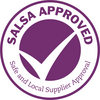
Salsa Standard - Safe And Local Supplier Approval
About (Salsa Standard - Safe And Local Supplier Approval)
The Salsa Standard, also known as Safe And Local Supplier Approval, is a food safety and quality certification scheme primarily used in the United Kingdom. It is designed to assess and ensure that small and medium-sized food suppliers meet specific food safety and hygiene requirements. Here are some key points about the Salsa Standard:
Purpose: The Salsa Standard is intended to provide an affordable and streamlined certification process for small and medium-sized food producers and suppliers. It helps them demonstrate their commitment to food safety, legal compliance, and best practices.
Criteria: The Salsa Standard incorporates the requirements of relevant food safety legislation, industry best practices, and customer-specific requirements. It covers various areas such as food safety management systems, premises and equipment, hygiene practices, traceability, allergen management, and supplier management.
Certification Process: To achieve Salsa certification, a supplier undergoes a thorough assessment of their food safety management systems and practices. This assessment is typically conducted by an accredited certification body or an approved Salsa auditor.
Continuous Improvement: Salsa certification is not a one-time achievement. Certified suppliers are expected to continuously maintain and improve their food safety and quality standards. Regular audits and reviews are conducted to ensure ongoing compliance with the Salsa requirements.
Supplier Approval: Once a supplier achieves Salsa certification, they become an approved supplier for retailers, wholesalers, and other buyers who recognize and require the Salsa Standard. The certification provides assurance to buyers that the supplier has met specific food safety criteria and is committed to maintaining high standards.
Benefits: The Salsa certification offers several benefits to suppliers, including increased market access, improved food safety practices, enhanced credibility and reputation, and a competitive edge in the marketplace. It also helps suppliers meet the expectations of customers and regulatory authorities.
It's important to note that the Salsa Standard is primarily focused on food safety and hygiene and may not cover broader sustainability or environmental aspects of food production. However, by promoting safe and compliant food practices, it indirectly contributes to the overall sustainability and integrity of the food supply chain.